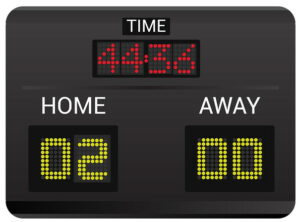 In football, it’s always fun to bet on goals scored. It’s the side of the game that is the most exciting and it’s rare that anyone would describe goalless draw as being a ‘thrilling’ encounter. Indeed, some bookmakers offer refunds if you place a bet on there being goals and the match ending in what they describe as a ‘bore draw’.
In football, it’s always fun to bet on goals scored. It’s the side of the game that is the most exciting and it’s rare that anyone would describe goalless draw as being a ‘thrilling’ encounter. Indeed, some bookmakers offer refunds if you place a bet on there being goals and the match ending in what they describe as a ‘bore draw’.
Yet from a manager’s point of view, clean sheets are the basis on which successful campaigns can be built.
Betting on a football team keeping a clean sheet might not seem all that sexy, but it can see you rewarded for your bravery. The big question you’ll want to know an answer to is how often it actually happens. Teams that concede fewer goals are obviously more likely to win football matches, but conceding less goals doesn’t automatically mean that you’re keeping clean sheets.
Clean sheet statistics are important for a lot of bets, such as: both teams to score, correct score, over/under team goals and may more. Here we’ll look at what you need to know. If you are looking for how often teams win-to-nil see our dedicated article.
Why Clean Sheets Matter

Conceding goals in football matches is a bad thing. It might seem like an obvious thing to say, but it’s true.
Looking at the last few seasons of Premier League football from 2015-2016, you can see that the team that conceded the fewest goals won the league title three times – four if you count the joint conceded goal of 26 in the 2021-2022 season.
In terms of when the side that conceded the fewest didn’t win the title, they were either second or else there was a good mix of teams that conceded so few goals.
| Season | Goals Conceded By Champions | Next Fewest / Fewest Goals Conceded |
|---|---|---|
| 2021-2022 | 26 | 26 |
| 2020-2021 | 32 | 36 |
| 2019-2020 | 33 | 35 |
| 2018-2019 | 23 | 22 |
| 2017-2018 | 27 | 28 |
| 2016-2017 | 33 | 26 |
| 2015-2016 | 36 | 35 |
If you turn to the other end of the table then you’ll note that it’s common for the sides that conceded the most goals to either get relegated or else be part of the relegation conversation. In terms of the English top-flight, then, goals conceded is an important metric for clubs that want to achieve some sort of success. Yet the ability to actually stem the flow of goals isn’t easy, which shouldn’t be all that surprising given how attacking the Premier League is.
Of course, conceding fewer goals isn’t the same as keeping clean sheets. In 2019-2020, for example, Manchester City kept sixteen clean sheets and Burnley managed fifteen. Yet in the league the Cityzens conceded 35 goals and Nick Pope let in 50 for the Lancashire club. Once a defence has conceded one goal, it doesn’t matter how many they concede after that in terms of clean sheet statistics.
Stopping the opposition from scoring gives confidence to the entire team. If a front line knows that his side is likely to be able to keep a clean sheet then they’ll be able to operate with the freedom of knowing that a single goal should be able to secure three points. Likewise, a midfield that can depend on its attack is able to support the forwards without panicking and defenders can rely on their goalkeeper if they can dig them out after errors.
How Often Clean Sheets Happen
 It’s important to realise that keeping clean sheets isn’t easy. Striking a balance between attack and defence is what managers find it hard to do, with those that master it usually adding silverware to their club’s cabinet.
It’s important to realise that keeping clean sheets isn’t easy. Striking a balance between attack and defence is what managers find it hard to do, with those that master it usually adding silverware to their club’s cabinet.
Looking at that same time period, the most clean sheets achieved by a goalkeeper was 21 by Alisson Becker. That means that his club Liverpool conceded in 17 games, which is just shy of half of the 38 games played.
Here’s a look at clean sheets from Premier League matches, taken by adding up the clean sheets kept by all clubs across five seasons. For consistency’s sake, we’ve continued looking at the 2015-2016 campaign through to the 2021-2022 season:
| Season | Premier League Clean Sheets | Percentage Clean Sheets |
|---|---|---|
| 2015-2016 | 215 | 56.6% |
| 2016-2017 | 214 | 56.3% |
| 2017-2018 | 226 | 59.5% |
| 2018-2019 | 207 | 54.5% |
| 2019-2020 | 207 | 54.5% |
| 2020-2021 | 224 | 58.9% |
| 2021-2022 | 212 | 55.7% |
| Average | 215 | 56.57% |
You can see from the table that a figure of 200+ clean sheets is common for a Premier League season.
With 380 matches per campaign, that’s over half of the games that will feature a clean sheet.
It’s not uncommon for a match to contain at least one clean sheet, therefore, but it is uncommon for one team to dominate the statistic.
Which Teams Keep The Most Clean Sheets?
| Team | Clean Sheets | Percentage Clean Sheets |
|---|---|---|
| Manchester United | 472 | 43.5% |
| Chelsea | 455 | 41.9% |
| Arsenal | 428 | 39.5% |
| Liverpool | 428 | 39.5% |
| Everton | 345 | 31.8% |
| Man City | 321 | 35.8%* |
| Tottenham | 318 | 29.3% |
* Manchester City have played less Premier League games compared to other teams due to not playing in all Premier League seasons.
As you can see from the table above in the history of the Premier League from 1992 to 2021 the teams with the most clean sheets are also the ones that have won the most titles.
This is with the exception of Manchester City, who spent a proportion of time in lower leagues before the big spenders came along. Still, when you factor in they have played less Premier League games the percentage of clean sheets is comparable with the top 4.
What is interesting is how much of a drop off there is from the top 4 teams to Everton and Tottenham in fourth and sixth place.
Consecutive Clean Sheets
| Team | Season | Consecutive Clean Sheets |
|---|---|---|
| Manchester United | 2008-2009 | 14 |
| Chelsea | 2004-2005 | 10 |
| Chelsea | 2006-2007 | 8 |
| Arsenal | 1997-1998 | 8 |
| Liverpool | 2005-2006 | 8 |
Clean sheets tend to happen when teams are playing well and have confidence. Therefore it is no surprise that clean sheets often occur in runs. This is partly because the teams performance is better defensively and partly because the more clean sheets a team and defence have the more motivated they are to keep that run going.
In the table above three out of the five teams won the Premier League in that season with the exception of Liverpool in 2005-2006 and Chelsea in 2006-2007.
Home vs Away
| Team | Home (%) | Away (%) | Total (%) |
|---|---|---|---|
| Man City | 10 (52.6%) | 7 (36.8%) | 17 (44.7%) |
| Liverpool | 7 (36.8%) | 8 (42.1%) | 15 (39.5%) |
| Man United | 7 (36.8%) | 6 (31.6%) | 13 (34.2%) |
| Chelsea | 8 (42.1%) | 1 (5.3%) | 9 (23.7%) |
| Leicester | 8 (42.1%) | 5(26.3%) | 13 (34.2%) |
| Tottenham | 6 (31.6%) | 2 (10.5%) | 8 (21.1%) |
| Wolves | 8 (42.1%) | 5(26.3%) | 13 (34.2%) |
| Arsenal | 5(26.3%) | 5(26.3%) | 10 (26.3%) |
| Sheffield United | 8 (42.1%) | 5(26.3%) | 13 (34.2%) |
| Burnley | 8 (42.1%) | 7 (36.8%) | 15 (39.5%) |
| Southampton | 3 (15.8%) | 6 (31.6%) | 9 (23.7%) |
| Everton | 6 (31.6%) | 3 (15.8%) | 9 (23.7%) |
| Newcastle | 7 (36.8%) | 4 (21.1%) | 11 (28.9%) |
| Crystal Palace | 6 (31.6%) | 4 (21.1%) | 10 (26.3%) |
| Brighton | 4 (21.1%) | 5(26.3%) | 9 (23.7%) |
| West Ham | 3 (15.8%) | 4 (21.1%) | 7 (18.4%) |
| Aston Villa | 7 (36.8%) | 0 (0%) | 7 (18.4%) |
| Bournemouth | 3 (15.8%) | 2 (10.5%) | 5 (13.2%) |
| Watford | 7 (36.8%) | 2 (10.5%) | 9 (23.7%) |
| Norwich | 2 (10.5%) | 3 (15.8%) | 5 (13.2%) |
The table above shows the number and percentage of home vs away clean sheets for all the teams from 2019-20 in the Premier League campaign.
Of course playing at home a team is more likely to keep a clean sheet and playing away they are more likely to concede. This is an important factor when placing a bet of course.
Above you can see the teams that are top at home are not necessarily the same as the ones who keep the most clean sheets away from home, Chelsea for example with 8 clean sheets at home and just 1 away. Only three teams: Liverpool, Brighton and Southampton, had more clean sheets away from home in the season than at home.
This is why research is also important, the way teams set up at home compared to away is a big factor in how likely they are to keep a clean sheet in any given match.
Do Your Research

In betting terms, then, you’re more likely to see your wager win if you decide that a team will concede a goal than if you think they won’t. Before diving in and placing a bet on a side stopping the opposition from scoring a goal, make sure you’ve done some research. Is there an important defensive player missing, for example? Is the reserve goalkeeper being played for some reason? They’re both key factors in the likelihood of a clean sheet.
Another important thing to think about is the fact that some teams are naturally more attacking than others. Though it’s obviously possible for an attacking team to stop opposition sides from scoring, as evidenced by José Mourinho’s Chelsea scoring 72 times and conceding just 15 on their way to 25 clean sheets during the 2004-2005 campaign, it’s not typical. If you’ve got a free-scoring team up against a similarly minded one, therefore, it’s best not to bank on clean sheets.
Equally, if you’re thinking about betting on a match featuring a team with a leaky defence up against a striker who is in red-hot form, you’d probably do well not to bet on clean sheets for at least one of the teams. Thankfully, there’s so much information online for bettors, from both official and unofficial sources, that you won’t have to look too far to find out what it is that you’re wanting to know before placing a wager.